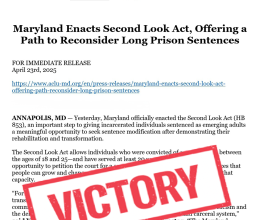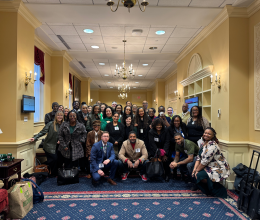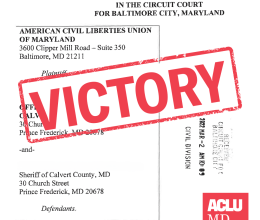
UPDATE: We are glad that the Department of Public Safety and Corrections is dropping an extreme proposal to ban incoming personal letters. But this should never have come up in the first place. The proposed ban comes on top of other changes that have harmed families’ ability to be in touch, like visitation rules. We are urging the Department to ensure that it is working in ongoing and meaningful partnership with families who can best advise the Department about how to ensure efforts to address security concerns do the least damage possible to families. The Department's proposed workgroup is an excellent place to start.
BALTIMORE, MD - The American Civil Liberties Union (ACLU) of Maryland and the ACLU National Prison Project are urging Maryland officials to withdraw an extreme proposal to ban all incoming letters to people housed in Maryland's prisons. In a letter to Department of Public Safety and Corrections Services (DPSCS) Secretary Stephen Moyer, the ACLU slammed the proposal as inhumane, unconstitutional and wrong-headed. If adopted, Maryland would be the first state prison system in the nation to ban all meaningful personal correspondence between those who are incarcerated and their families, friends and supporters- when there is more evidence than ever that preserving family and community ties is critical to institutional and public safety, as well as prisoner health and well being. The proposed rule would harm not only the 21,000 people in Maryland state prisons, but also the tens of thousands of people who wish to stay in touch with them and to help them prepare for their return back to the community.
"I have every letter ever sent to me from my wife and my father while I was incarcerated," said Stanley Mitchell, who returned to his family in 2013 after spending more than three decades in the Maryland prison system. While in prison, Mr. Mitchell mentored fellow prisoners, something that he still does since being released. "Mail is extremely important. Some people plan their whole day around mail call. It's their lifeline to the outside. Some have elderly parents who can't visit and family who can't afford to pay high rates for phone calls, so mail is their only way of staying in touch."
Under the proposed DPSCS rule, men and women incarcerated in Maryland prisons would be permanently barred from ever receiving any meaningful personal correspondence from their loved ones or any other non-legal support group. They would be permitted only postcards. Yet, people may spend decades-or their entire lives-in prison. More than 2,000 of the 21,000 people in Maryland prisons are serving life sentences. Under the proposal, they would never again receive another letter from their mothers, children, fathers, or others. Instead, their families would be forced to put heartfelt messages into what is, essentially, the paper equivalent of a tweet that can be read by anybody. The proposed rule also would ban letters from other support networks for those in prison, forbidding a pastor from writing to an incarcerated parishioner, or any organization that provides supportive services to those who are inside.
"We are astonished that this proposal is even on the table," said Sonia Kumar, staff attorney with the ACLU of Maryland. "It is profoundly wrong-as a matter of common sense, best practices and just basic decency-to deny families the ability to communicate by letter. So much living-connecting emotionally and managing personal affairs-must happen by mail when a loved one is incarcerated."
The ACLU believes that the proposed DPSC policy violates the constitutional rights of families, friends and advocacy organizations that maintain relationships with those who are incarcerated and also reflects a poor policy choice among the many options available to address the introduction of contraband into DPSCS facilities. Importantly, postcard-only mail policies have been invalidated by courts in a number of jurisdictions throughout the country. Yet, Maryland appears to be the first state corrections system to propose a permanent letter ban.
"Prisons have been operating in this country without banning letters for over 200 years," said David Fathi, Director of the ACLU National Prison Project. "So to suggest that there's suddenly some urgent security need to enact these policies just doesn't pass the laugh test."
Additional Quotes_
"I cannot imagine my 70-month prison sentence without letters and greeting cards from my family and friends. Staying connected to my family and friends is certainly a part of what I attribute to my successful reintegration post incarceration. Letters were there, when people could not come to visit and I could not afford to call them from prison. Being able to communicate with people beyond the gate was how I remained connected and grounded to those who I left behind, especially my daughter. She and I used long and thoughtful letters to convey what we could not say in our limited and expensive phone calls and visits.
- Teresa Y. Hodge Co-Founder Mission: Launch, Inc. and a 2016 Soros Justice Fellow
"This is yet another policy that isolates and destroys family ties. It hurts me to my core to think I can never send my loved one a private letter expressing my love and giving encouragement. I know he rereads letters and holds on to them, like letters from his mom who passed away. For people inside, letters are a memory that provide comfort during hard times. This change would hurt both of us."
-- Martina Simms, whose partner is incarcerated in the Maryland DOC
###





